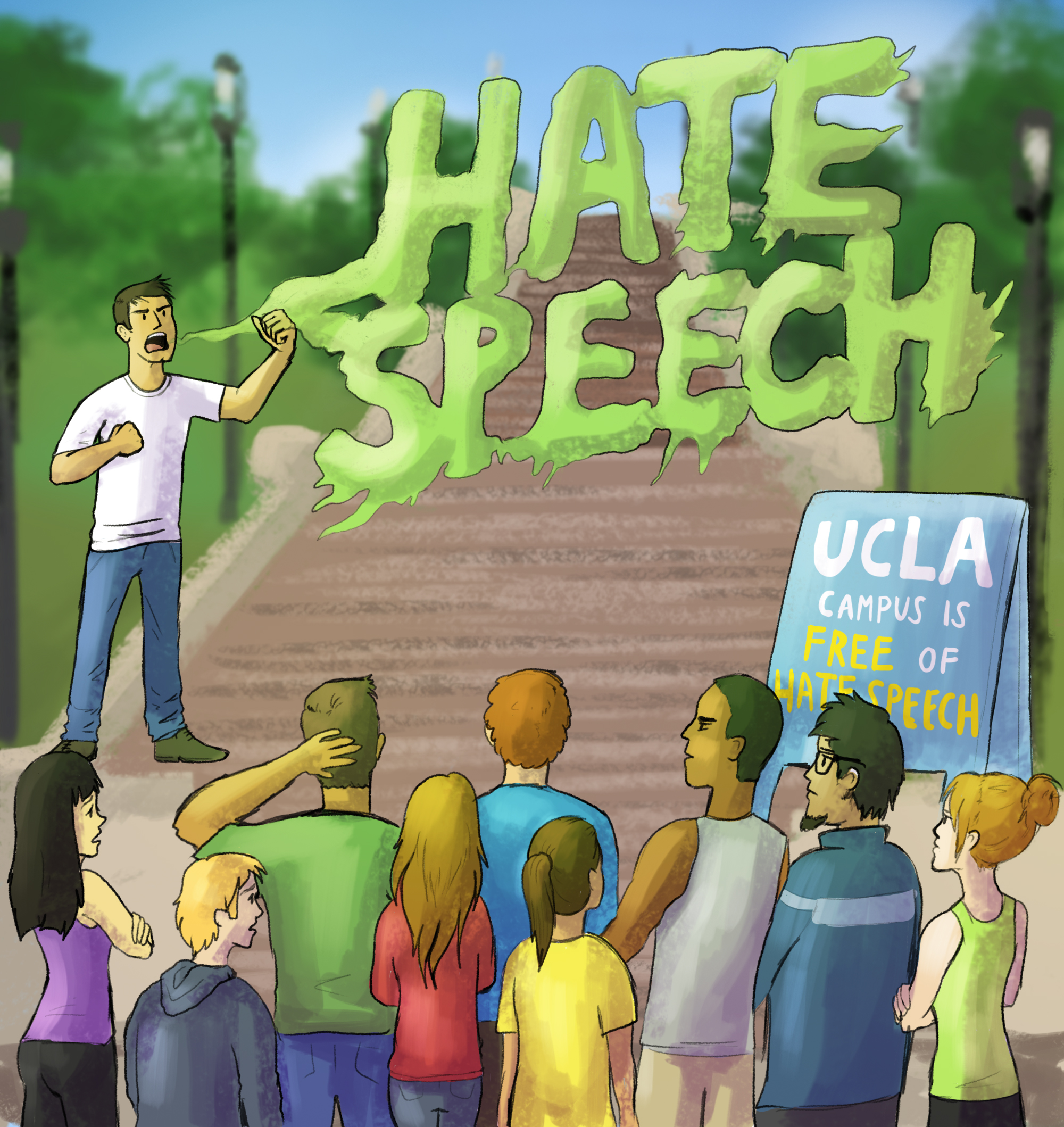Chris Campbell: Equity measures should protect free speech, but promote mutual respect

(Kelly Brennan/ Daily Bruin Senior Staff)
By Chris Campbell
Jan. 4, 2016 12:07 a.m.
Yet another free speech column? Please, try to contain your excitement.
Apparently we didn’t get nearly enough self-aggrandizing punditry and opining on all sides of the political spectrum in 2015 when that famous question took college campuses nationwide by storm: Should speech be limited in the name of tolerance? So here I am, kicking off 2016 by rehashing that old narrative.
You’ve heard the story before. At dozens of colleges across the country, including Yale, Mizzou, Wesleyan and UCLA, students were outraged by controversial speech and demanded that university administrators take responsibility in denouncing or even censoring it. On the other side, an intense backlash from mainly conservative groups decried the apparent murder of free speech by the infamous bogeyman known as “political correctness”.
But that narrative is an oversimplification of a necessarily complex situation. Suggesting that the balance between protecting marginalized groups and free speech rights is a zero-sum game ignores the underlying issues at play.
While the Office of Equity, Diversity and Inclusion already has mechanisms in place for students to report instances of discrimination by faculty, staff and students, it needs to take a strong, preemptive stance against acts of intolerance. But here’s the kicker: It needs to do so without threatening the First Amendment.
First, a textbook lesson on how not to handle hate speech. Consider the University of Missouri’s student body president, who was called the n-word by white students. Twice. And that was just two in a long line of racial incidents that ended up toppling the Mizzou president’s entire administration.
The reason the Mizzou protests became so big and problematic was that their administration was only reacting – poorly, I might add – to these incidents instead of having a strong anti-discrimination framework in place to nip these issues in the bud quickly and effectively. That is, it wasn’t the hate speech itself causing all the ruckus, but rather the university’s own bungled response to it.
The fact that the Office of Equity, Diversity and Inclusion even exists means that UCLA is already miles ahead of Mizzou in this respect. But it can do more.
The office can use its administrative power to engage the student body through forums, discussions and other public events. People will realize how their actions and words can affect others and will hopefully learn to be more sensitive. The important thing is that the university provides the community with the means to respond and have their voices heard.
READ MORE: Arthur Wang: Free speech still alive at UCLA
The biggest thing the office can do is take a strong, preemptive stance against intolerance by instituting a limited version of a hate speech code. Such a code would communicate with specificity what exactly constitutes hate speech and would provide a framework for the office to work with when such incidents do arise.
Of course, as UCLA law professor Eugene Volokh noted, the university can’t attach concrete disciplinary procedures to anti-discrimination policies without violating the First Amendment.
Yet the office doesn’t have its hands completely tied when it comes to taking action against hate speech. The American Bar Association has an interesting take on this issue. Instead of actively trying to suppress hate speech, the office could use incidents of hate speech, say, Islamophobic posters, to spark a real discussion about how said hate speech isn’t consistent with the values that UCLA put forth.
UCLA’s Vice Chancellor of Equity, Diversity and Inclusion Jerry Kang – the man in charge of maintaining an equitable and free academic environment – seems committed to academic freedom. In a December interview with the Daily Bruin’s editorial board, Kang emphasized that students can help promote tolerance by learning why certain actions and speech could create an inhospitable learning environment for some students.
And while Kang is right in promoting those kinds of voluntary interactions, they can only go so far as to structure an equitable academic environment.
That may seem overly optimistic, but I agree with Kang’s sentiment that most students want to do the right thing and help create a respectful learning environment. That’s why I don’t believe in the free speech vs. anti-discrimination trade-off narrative.
Unpopular opinions should be discussed, both inside and outside the classroom. After all, the First Amendment’s free speech clause was written specifically to protect a citizen’s right to express controversial opinions.
But mutual respect is the name of the game here.
If the office can take a strong stance against hate speech while protecting students’ free speech rights and encouraging respectful dialogue, perhaps it can help break that old zero-sum game narrative. And who knows? Maybe we won’t have to read so many free speech columns anymore.


